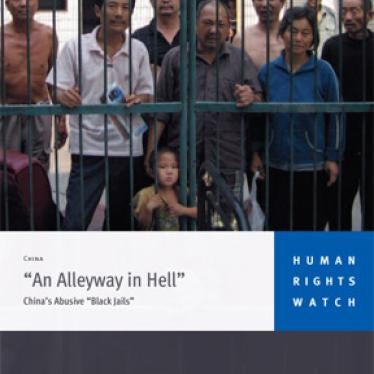When 15-year-old Wang Xiaomei made the long trip from Gansu province to Beijing last year, she hoped to find justice for her family. Instead, she met with abuse.
First, Wang was abducted by plainclothes Gansu officials, who imprisoned her incommunicado for two months in a "black jail"-an illegal detention facility.
Two days before her September 13, 2008 release, Wang's captors beat her so badly they knocked out one of her teeth. Wang's victimizers have never been brought to justice.
Worse still, Wang's experience-which stands in stark contrast to the Chinese government's claims of fealty to the rule of law-is not unique. A new Human Rights Watch report released today, "An Alleyway in Hell: China's Abusive ‘Black Jails'," exposes the routine and severe human rights abuses perpetrated against detainees in these secret facilities.
Our research shows that Wang is just one of estimated thousands of people abducted off the streets of Chinese cities and held incommunicado for weeks or months. Inside these unlawful, secret detention facilities detainees are beaten, sexually abused, deprived of food, sleep and medical care, and subject to theft, extortion and intimidation at the hands of their guards.
And, as Wang's case shows, children aren't spared the dangers and indignities of black jail detention. These facilities exist outside of China's official prison system, and are often located in state-owned hotels, nursing homes and psychiatric hospitals.
The former black jail detainees we interviewed were petitioners-people from mainly rural areas who come to Beijing and other cities in search of legal redress for violations including illegal land seizures and police torture. The petitioning system, which exists in parallel to formal judicial structures, is entirely legal, and explicitly permits people to take their grievances to the highest levels of government.
So why are petitioners being treated this way? Black jails emerged in 2003 after the Chinese government abolished laws permitting the arbitrary detention of any "undesirables." But that progress was undercut by the introduction at the local level of guidelines that limit local officials' prospects for promotions or raises if petitioners from their areas carried on their efforts to find justice in larger cities.
What might have been intended as an incentive to make local officials deal with local grievances became an incentive for those officials to keep petitioners off the streets and invest considerable resources in achieving that goal. Plainclothes thugs commonly known as retrievers, or jiefang renyuan, locate and abduct petitioners in Beijing and other cities for bounties as high as $250 per person. Operators of black jail facilities reap daily cash payments from local governments of up to $29 per detainee, helping to perpetuate black jail abuses.
Rather than crack down on these facilities, the central Chinese government denies that they even exist. In an April 2009 Chinese Ministry of Foreign Affairs press conference, a MOFA official responded to a foreign correspondent's query about black jails by insisting, "Things like this do not exist in China." In June 2009, the Chinese government asserted in the Outcome Report of the United Nations' Human Rights Commission's Universal Periodic Review of China's human rights record that, "There are no black jails in the country."
Such denials make a mockery of the commitment in the first-ever National Human Rights Action Plan that, "The Chinese government unswervingly pushes forward the cause of human rights in China." The Chinese government's credibility would be considerably enhanced by acknowledging that black jails do indeed exist, shutting them down, liberating detainees, and bringing the perpetrators to justice.
External actors also have a role to play. Many governments and international organizations fund Chinese legal reform projects, and they too should demand that the Chinese government put an end to these abuses and that their victims be fairly compensated.
No less a civil rights and legal aid luminary than US President Barack Obama, who will make his first trip as President to China on November 16-18, has a golden opportunity to raise the cases of black jail detainees and explain that an independent judicial system in China is of significant consequence to U.S.-China relations.
He should also repeat to his Chinese hosts-and the Chinese people-his September 2009 message to the United Nations General Assembly: "True leadership will not be measured by the ability to muzzle dissent, or to intimidate and harass political opponents at home."
----
Phelim Kine is an Asia researcher for Human Rights Watch.







